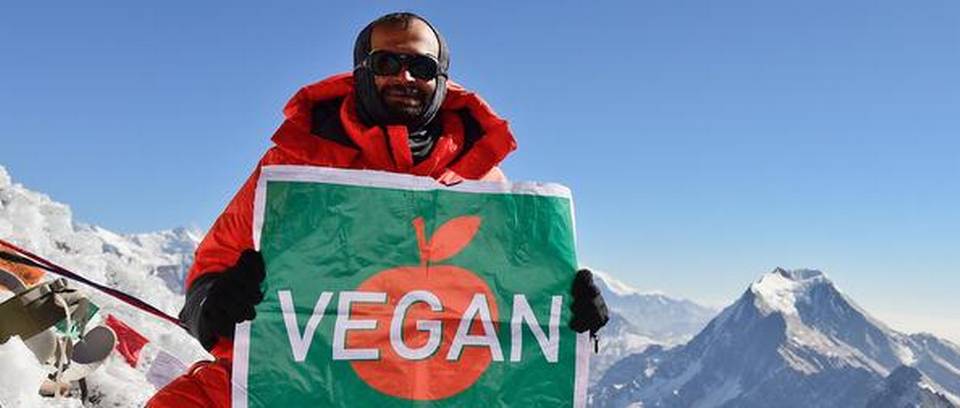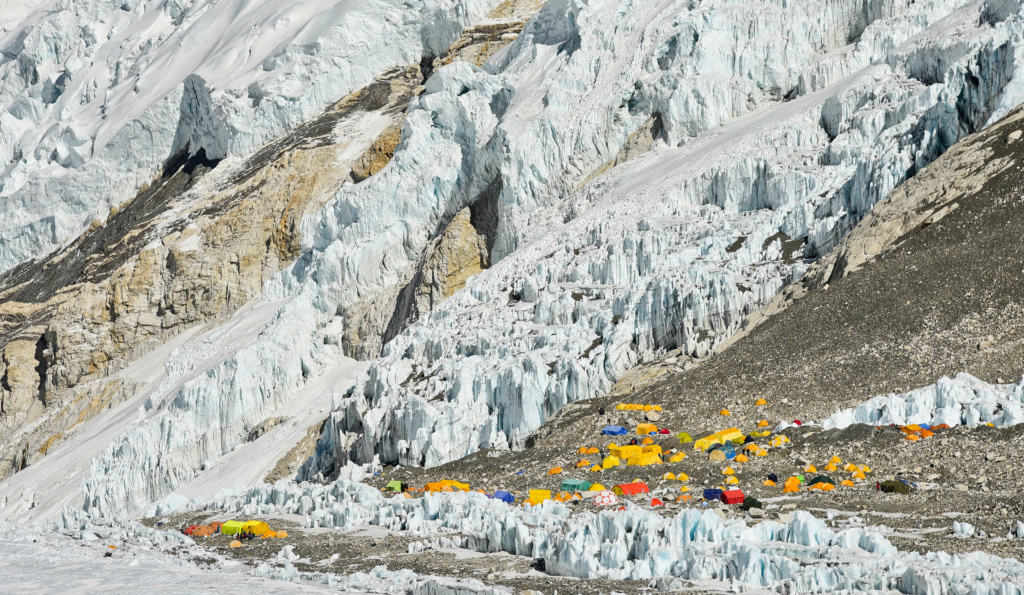On his second attempt on Everest, Kuntal Joisher irons out the flaws to make a successful vegan climb up the highest mountain in the world.

First published: https://www.thehindubusinessline.com/blink/explore/scaling-heights-as-a-vegan-mountaineer/article28579003.ece
Kuntal Joisher: On being a vegan mountaineer
The mountaineer’s Everest mission was not just about scaling new heights
Even before he took to mountaineering in 2011, Kuntal Joisher, now 39, always had a mountain to climb. The biggest of them was a life choice he made in 2002 — that of turning vegan. Eleven years later, as he prepared for his maiden attempt at climbing Mount Everest, Joisher set up a second target for himself: A climb that was free of animal cruelty, whether in terms of food or gear.
He realised that dream on May 23 this year.
It was as an engineering student in the US that Joisher first heard of veganism. After poring over material related to dairy, leather and poultry industries, he realised that his vegetarian palate was not free of animal cruelty. “There is no difference between a glass of milk, a leather belt, a slice of beef or a block of cheese, because the cow is being grown as a plant or an object. It is going to be slaughtered at the end of the day,” Joisher tells BLink.
Once clear on his intent, he turned vegan overnight. That meant sticking to a diet that was free of every animal or animal-derived product — such as meat, eggs and dairy. Back in the US, there were plenty of options to support his diet, but the challenges began after Joisher returned to Mumbai. His Kutchi family didn’t see what the problem was with a little ghee, milk or butter in his meals. At restaurants, for lack of a better explanation, he would say that he was allergic to dairy products.

On the mountains, these problems increased manifold. For starters, he had to send across his dietary needs to the agencies that organise mountaineering expeditions well in advance. They acknowledged his request with just one question: How exactly was he going to climb as a vegan?
“They said I must eat meat, dairy products and eggs, else I wouldn’t get the adequate nutrition. And believe me, it’s still a mental block in the community despite what I’ve pulled off,” says Joisher.
His first attempt at climbing the Everest in 2014 was cut short by an accident in the Khumbu Icefall in which 16 Sherpas died; the following year, the earthquake in Nepal led to the cancellation of expeditions. But in between the two, Joisher had his first experience of climbing an 8,000-m mountain when he scaled Manaslu, Nepal, in the autumn of 2014.
It wasn’t just enough for Joisher to focus on the climb. He had to also spend enough time in the kitchen tent to “veganise” his meals. “I would have oatmeal without the milk and ask them to remove portions of food before they added ghee. At the same time, I had to ensure that I wasn’t making their life difficult, because at 5,380m (the height of the Everest Base Camp), life is already difficult,” he says with a chuckle.
At the Base Camp, Joisher’s list of don’ts was put up at the kitchen tent. But there were still occasions when he realised that he hadn’t got his point across. “They served croissants, which they said were vegan. But I saw them add eggs to the mix. So I had to sit the staff down and explain my stance,” Joisher says.
On Manaslu, Joisher survived on a diet that heavily depended on rotis. For the summit push, he banked on electrolytes. It was adequate for the moment, but he knew that there was more to be done.
Following the Manaslu success, Joisher signed on with Unived, a vegan company that makes plant-based nutritional products, and used its electrolyte powders and gels while training for his Everest attempt in May 2016. He scaled the peak that year, but couldn’t completely abide by vegan methods on that climb. He had a hard time figuring out his nutrition requirements. He had come across Outdoor Herbivore, a company that made freeze-dried vegan meals. But the meals took ages to cook at higher altitudes, leaving Joisher with raw pasta on one occasion. And the energy gels, which were meant for his summit attempt, froze in the biting cold. “For over a day, I was without solid food, though I don’t think it was a big deal because you are so focussed on getting back safely,” he says. Joisher learned from the experience and worked to make his 2019 attempt foolproof.
A vegan climb involved bidding goodbye to leather shoes and gloves, goose-down jackets, sleeping bags with silk liners and woollen thermals. Joisher scouted the market, both online and offline, for replacements — all he found were a few polypropylene and synthetic variants. On a friend’s suggestion, he wrote to Save the Duck, a brand that makes animal-friendly jackets and clothes, in 2017; the same day, he received a promising response from them. “I collaborated with their team in Italy and gave my inputs for the down suit. Around the same time, I signed up for an attempt on Lhotse [on the Nepal-Tibet border], scheduled for 2018, with the intention of testing the gear,” Joisher says.
Back home, Joisher started work on the mittens. He first sourced nylon and another insulation material, Primaloft, and then got down to designing it with a friend in Kathmandu, who had climbed the Everest in 1983. A local tailor stitched the final product.
When he stood at the Base Camp on April 23 the following year, he was told that the down suit was still on its way. There was just one catch — the two pieces of gear hadn’t been tested yet.
During the seven days he used it on the ascent, Joisher had no problems with the design, aside from the lack of breathability. With the summit of Lhotse — the fourth highest mountain in the world — on May 15, Joisher moved one step closer to his target.
To sort out the food quandary, Joisher reached out to Nutrimake, a Bengaluru-based company that makes plant-based powder. Once mixed with water, it could be enjoyed like a mealshake. Once again, he worked with them to create a product that would tend to his calorie needs. After years of trial and error, Joisher finally achieved his dream this year. “It’s funny how they drag me into discussions about vegan climbers struggling on mountains even today. I simply remind them that this vegan is still alive,” he says.